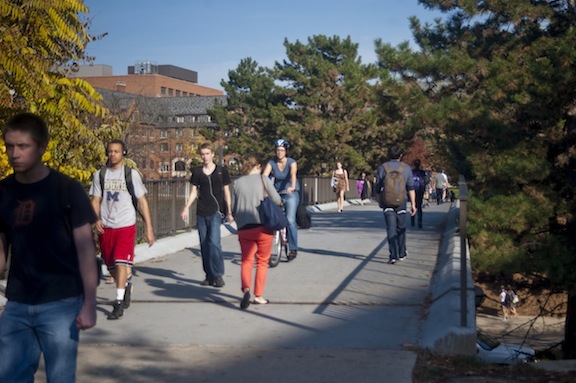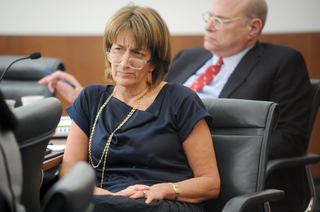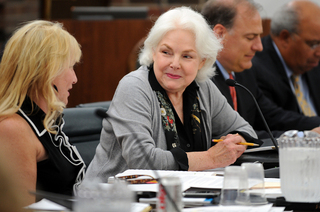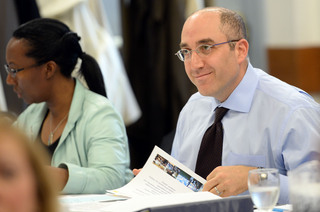U-M and EMU to set tuition rates this week: What will the increases look like?

University of Michigan's campus is pictured above. The school's governing board will vote on tuition this week.
Joseph Tobianski | AnnArbor.com
In the midst of a national college affordability debate as Congress discusses federal student loan rates — which are scheduled to double in two weeks — local university leaders are deliberating on the affordability of the institutions they lead.
How much should they raise tuition? Is a freeze possible? Should out-of-state students receive more substantial tuition hikes than Michiganders?
The elected leaders of University of Michigan and appointed leaders of Eastern Michigan University are discussing these exact questions this week— and their answers will impact the pocketbooks of tens of thousands of college students and their families.
The eight-member governing boards of Washtenaw County universities will decide on tuition rates and fiscal 2014 budgets during public meetings this week.
Both boards generally are mum about budget and tuition votes before they take place —all eight members of the U-M Board of Regents did not respond to or declined requests for comment — so details on changes are unclear.
One thing is likely: both schools most likely will keep tuition increases at or under 3.75 percent, otherwise their state funding will be affected. For EMU, which heavily relies on state funding, the added revenue of a large tuition hike likely wouldn't be worth a loss in state funds.
The chair of EMU's board also did not respond to requests for comment.
At U-M, the form of a tuition increase —if one happens at all— is likely to be heavily debated by board members.

Andrea Fischer Newman
Melanie Maxwell I AnnArbor.com

U-M regents Denise Ilitch and Julia Donovan Darlow.
Melanie Maxwell I AnnArbor.com

Mark Bernstein
Melanie Maxwell I AnnArbor.com
Last year a 2.8 percent increase passed in a 5 -3 vote during a June meeting. The three regents who voted against the increase —Andrea Fischer Newman, Denise Ilitch and Larry Dietch— remain on the board.
During the June 2012 meeting, Ilitch criticized skyrocketing tuition, a term she borrowed from President Barack Obama, who railed against rising college costs during an affordability speech at the Ann Arbor campus in January 2012.
“I won’t ask students to pay more if I think we can do more," she said.
Meanwhile, two of the regents who supported the increase have since retired from the board. They've been replaced by Mark Bernstein and Shauna Ryder Diggs, both Democrats elected in November.
Bernstein, of Ann Arbor, said during the election he would have voted against the 2012 tuition increase. Diggs, in an October interview, did not say whether she would have voted against the increase.
"2.8 percent is not huge but I really think they need hold costs or decrease costs," she said at the time.
Resident tuition at U-M has increased 63 percent in 10 years. In 2003-04, tuition and fees were $7,975 for lower-division residents. Today it is $12,994. In the past decade, the lowest tuition increase was 1.5 percent and the largest was 12.34 percent.
In a March interview Newman said she could envision a tuition freeze but was unsure if the board could agree to one.
"I think it is expensive to go to college, whether you're in state or out of state. You can't price yourself out of the middle class. You just can at do that. That's not what we're about," Newman said. "There are plenty of studies that show people will pay more to come here, but is that what we are about?"
U-M officials have been reluctant to embrace tuition freezes. In 2012 former provost Phil Hanlon, now leader of Dartmouth College, said tuition increases are integral to a balanced budget because "every year our costs are going up."
Yet some question shifting cost increases onto students through tuition hikes.
"I will continue to vote against tuition increases if I believe that the university is not thinking about this in a thoughtful, creative way to control skyrocketing tuition and crushing student debt," Bernstein said prior to being elected regent. "This is a model that is unsustainable and it's going to require everybody taking a stand against it."
Tuition this year was $39,122 for out-of-state undergraduates. In past years tuition increases for out-of-state students have been larger than increases for in-state students. Despite the increase in non-resident tuition, the number of applications from out-of-state continues to grow.
U-M administrators have said net cost for low-income students actually has decreased in recent years because of increases in centrally-awarded financial aid. Last year the school's general fund awarded $144.8 million in scholarships and aid.
EMU's board increased tuition 3.95 percent last year, just under the 4 percent cap imposed by the state legislature that year. Full-time resident undergraduates at EMU pay $9,026 per year in tuition and fees.
EMU's public Board of Regents meeting takes place Tuesday and U-M's takes place Thursday.
Kellie Woodhouse covers higher education for AnnArbor.com. Reach her at kelliewoodhouse@annarbor.com or 734-623-4602 and follow her on twitter.


Comments
Glenn Galler
Tue, Jun 18, 2013 : 12:31 a.m.
Well let's see… With Brady Hoke taking $3 or $4 million and Al Borges taking $900,000 and being the most uncreative offensive coach this side of the Mississippi River, I think it's time for a rate hike in tuition. That just makes all the sense in the world.
blue85
Tue, Jun 18, 2013 : 2:18 p.m.
"Well let's see… With Brady Hoke taking $3 or $4 million and Al Borges taking $900,000 and being the most uncreative offensive coach this side of the Mississippi River, I think it's time for a rate hike in tuition. That just makes all the sense in the world." So, it is true, there are people outside of Columbus OH, that don't know that the athletic budget is completely self-supporting and in fact repatriates money to the academic side, not the other way around.
Hugh Giariola
Mon, Jun 17, 2013 : 7:39 p.m.
Here is how the universities get away with tuition increases: Don't call it tuition, call it a FEE. The colleges and universities seem to be able to impose any number of fees they choose, which fall outside the normal tuition increase. If it looks like a duck, walks like a duck, and quacks like a duck, it's a duck.
dugster
Mon, Jun 17, 2013 : 6:34 p.m.
Question. How come the Board of Regents are elected by the voters, at UofM but appointed by the governor at EMU? I would have loved to vote everyone of the Regents who voted out the Huron Logo when I was going to EMU but never got the chance because the governor appoints them.
TruEMU_fan
Mon, Jun 17, 2013 : 7:21 p.m.
It has to do with the State Constitution. The Board of Regents at Michigan are one of three elected university governing boards in the state (the others being the Michigan State University Board of Trustees and the Wayne State University Board of Governors). All the other public institutions have their boards appointed by the governor.
ChrisW
Mon, Jun 17, 2013 : 6:23 p.m.
If you have to ask, you can't afford it.
YpsiLivin
Mon, Jun 17, 2013 : 5:58 p.m.
I have often thought that the federal government is missing a public policy opportunity with student loans. Subsidized student loans should be offered to students interested in studying/working in high demand, high employment fields - mathematics, science, engineering, medicine, nursing, etc., and should not be offered to students who want to study in low-demand fields. The process of getting subsidized graduate student loans should be exceptionally rigorous. In other words, if students want to study and prepare themselves to work in a field where the decent-wage jobs exist, then I don't have a problem with the government loaning (or even giving) the money to students to go to school. If students want to study in a field where their study costs are high and their employment prospects are low (leading to "crushing debt"), then they can pay for their degrees themselves. It would solve a few problems right off the bat- namely the inability of employers to fill high-wage, high-demand positions, and the accumulation of excessive student loan debts by borrowers who have no meaningful employment prospects after graduation. It would also force colleges and universities to reconsider their propensity to create expensive degree programs that don't address a clear market demand.
BornNRaised
Mon, Jun 17, 2013 : 5:44 p.m.
Answer: High.
andys
Mon, Jun 17, 2013 : 5:34 p.m.
Even adjusted for inflation, college is significantly more expensive than 30 years ago! Why? Even potential efficiency and savings from the introduction of new technologies of the past 10 to 15 years have not slowed the increases. It's the river of cash provided by govt subsidized student loans that allowed institutions to raise tuition faster than inflation pushing it out of the reach of the middle class (unless huge sums are borrowed). I agree with Djacks that this is a bubble waiting to burst.
Stuart Brown
Tue, Jun 18, 2013 : 4:21 a.m.
Evan Smith said, "You think tuition increased because the government was too generous?" I'd say not too generous but what the government did about 30 years ago was increase support for student loans while not putting in place any cost controls for institutions that received tuition dollars paid for with government backed loans. Schools responded by increasing tuition at about twice the rate of CPI inflation for a 30 year period. This has enabled places like UofM to increase overhead while not improving the educational experience much. Engineering graduates from UofM make about what they did 30 years ago adjusted for inflation but pay about double in real terms for the same education.
Tom
Mon, Jun 17, 2013 : 8:36 p.m.
It would be naive to deny that easy access to student loans has fueled the demand for a college education. And with a limited supply of top-ranked Universities and a huge demand, costs will go up. Subsidized mortgages helped to spur the increased cost of housing and government subsidized student loans are driving up the cost of a college education. To add salt to the wound students taking out Federal loans today many of which who have limited or no income are paying higher rates for for student loans to subsidize the Healthcare Affordability Act. http://obamareport.blogspot.com/2013/05/student-loans-subsidize-obamacare.html Furthermore, the government is projecting to make more money off studeent loans than the profits of Exxon, Apple and others did in 2012. Let's here it for government looking out for the little guy and protecting us from those evil capitalists. http://www.usatoday.com/story/news/2013/06/16/us-government-projected-to-make-record-50b-in-student-loan-profit/2427443/
Evan Smith
Mon, Jun 17, 2013 : 7:01 p.m.
You think tuition increased because the government was too generous? I really hope you're not serious. I don't know about you, but I find the current situation to be much more likely caused by the decreasing state aid towards public universities. Michigan used to have well over 60% of it's budget come from the state . It's at only 4.5% today. You mustn't forget, the cost of educating a student at the vast majority of public universities has gone DOWN when giving consideration to inflation. It's was the shift from state allocations to tuition that is the major cause of these obscene costs that we see today.
djacks24
Mon, Jun 17, 2013 : 5:21 p.m.
"At U-M, the form of a tuition increase —if one happens at all" Really...If? Come on! Post secondary education has got to be the next bubble to burst. If I were a parent with a college age kid, I'd have them start out a WCC (for lack of a preferable local community college) just like I did and try to take as many credits there as humanly possible and try to wait out the upcoming implosion of the post secondary education system. It needs a complete revamp and overhaul or else a collapse seems inevitable.